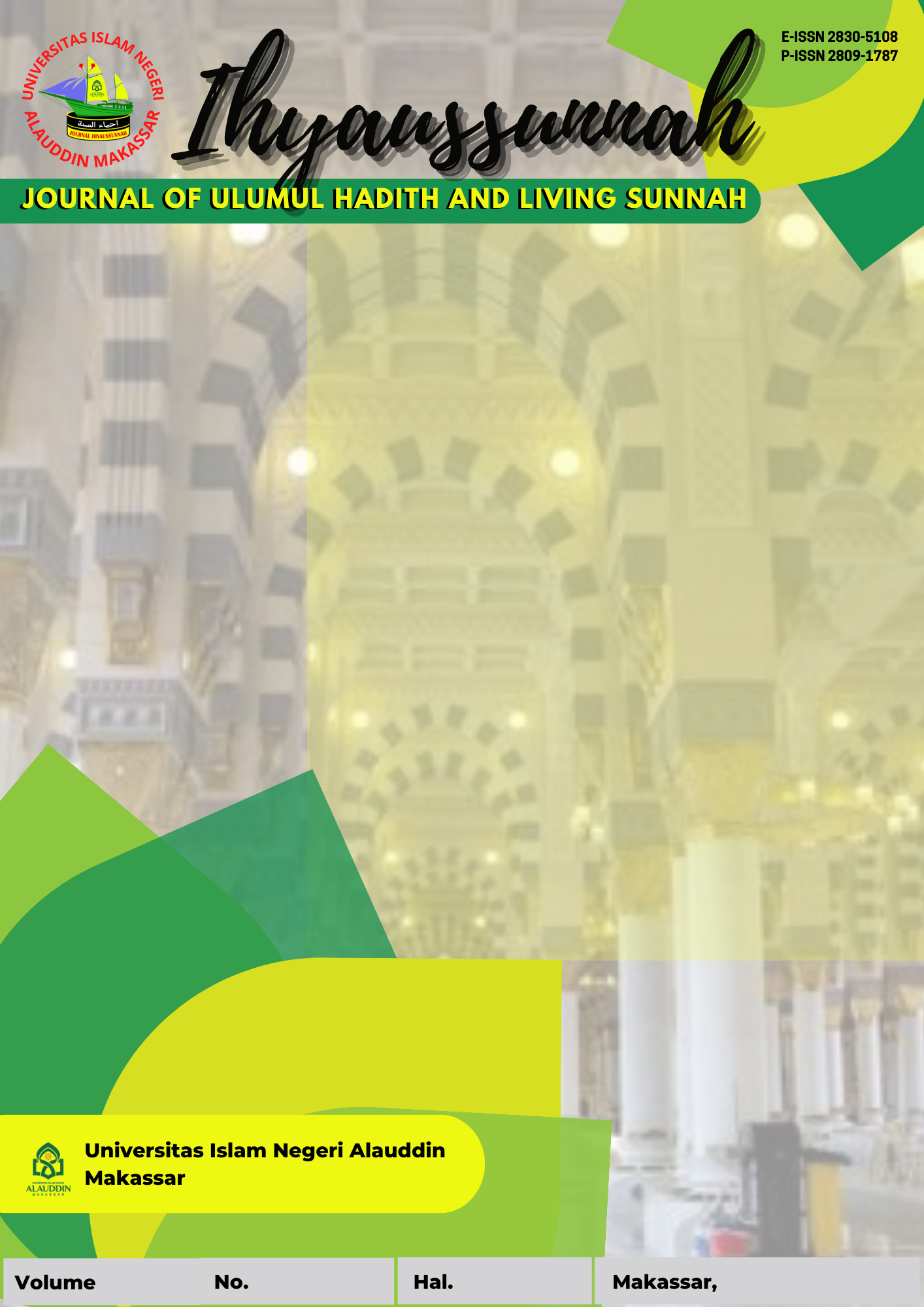Tahlili Study of the Practice Most Loved by Allah
Abstrak
This paper discusses the most beloved practice of Allah, using the tahlili hadith analysis of 'Aisha's hadith. It can be understood that the Prophet prescribed a moderate approach to doing good deeds, emphasizing that the most beloved deeds to Allah are those done continuously, even if they are small. The Prophet himself consistently performed deeds, and he prohibited people from disconnecting from their actions. He encouraged people to engage in small, continuous practices to avoid burdens and prevent boredom.
##plugins.generic.usageStats.downloads##
Referensi
Abu> ‘Awa>nah, Ya’qu>b bin Ish{a>q. Mustakhraj Abu> ‘Awa>nah. Cet. I; Beirut: Dar al-Ma’rifah, 1419 H.
Abu> Ya’la, Ah{mad bin ‘Ali. Musnad Abu> Ya’la. Cet. I; Damaskus: Dar al-Ma’mun Li al-Turas, 1404 H.
Al-Baihaqi, Ah{mad bin al-H{usain bin ‘Ali. al-Sunan al-Kubra. Cet. III; Beirut: Dar al-Kutub al-‘Ilmiyyah, 1424 H.
Al-Bukha>ri, Muh{ammad bin Isma>’i>l. Sahi>h al-Bukha>ri. Cet. I; Dar Tauq al-Najah, 1422 H.
Al-H{ajja>j, Muslim. Sah{i>h Muslim. Beirut: Dar Ihya al-Turas al-‘Arabi.
Al-Nasa>i, Ah{mad bin Syu’aib. Sunan al-Nasa>i. Cet. II; Halb: Maktab al-Matbu’at al-Islamiyyah, 1406 H.
Al-Sa’di, Abd al-Rahma>n bin Na>sir bin Abdulla>h. Taisi>r Al-Kari>m Al-Rahma>n fi> Tafsi>r Kala>m Al-Manna>n. Cet, I; Beirut: Muassasah Al-Risalah, 1420H/2000M.
Al-Taha>wi, Ah{mad bin Muh{ammad. Syarah Musykil al-A>sar. Cet. I; Beirut: Muassasah al-Risalah, 1415 H.
Al-Zahabi, Muh{ammad bin Ah{mad. Siyar A’la>m al-Nubala>. Cet. III; Beirut: Muassasah al-Risalah, 1405 H.
Al-Zurqa>ni, Muh{ammad bin ‘Abd al-Ba>qi. Syarah al-Zurqa>ni. Cet. I; Kairo: Maktabah al-Saqafah al-Diniyyah, 1424 H.
Anas, Ma>lik. al-Muwatta. Cet. I; Abu Dhabi: Muassasah Zaid bin Sultan, 1425 H.
Ibnu ‘Abd al-Bar. al-Tamhi>d. Magrib: Wazarah ‘Umum al-Auqaf, 1387 H.
Ibnu al-‘Arabi, Abu> Bakr. al-Masa>lik Fi> Syarh{ Muwatta Ma>lik. Cet. I; Dar al-Magrib al-Islamy, 1428 H.
Ibnu al-Asi>r, Al-Muba>rak bin Muh{ammad. al-Niha>yah Fi> Gari>b al-Hadi>s Wa al-Asar. Beirut: al-Maktabah al-‘Ilmiyyah, 1399 H.
Ibnu H{ajr, Ah{mad bin ‘Ali. Fath{ al-Ba>ri Syarh{ Sah{i>h al-Bukha>ri. Beirut: Dar al-Ma’rifah, 1379 H.
Ibnu H{ajr, Ah{mad bin ‘Ali. Taqri>b al-Tahzi>b. Cet. I; Suriah: Dar al-Rasyid, 1406 H.
Ibnu Hanbal, Ah{mad bin Muh{ammad. Musnad Ah{mad. Cet. I; Beirut: Muassasah al-Risalah, 1421 H.
Ibnu Khuzaimah, Muh{ammad bin Ish{a>q. Sahih Ibnu Khuzaimah. Cet. III; al-Maktab al-Islami, 1424 H.
Ibnu Ma>jah, Muh{ammad bin Yazi>d al-Qazwaini. Sunan Ibnu Ma>jah. Cet. I; Dar al-Risalah al-‘Alamiyyah, 1430 H.
Ibnu Ra>hoya, Ish{a>q bin Ibra>hi>m. Musnad Ish{a>q bin Rahoya. Cet. I; al-Madinah al-Munawwarah: Maktabah al-Iman, 1412 H.
Ibnu Rajab, ‘Abd al-Rah{ma>n bin Ah{mad. Fath{ al-Ba>ri Syarh{ Sah{i>h al-Bukha>ri. Cet. I; al-Madinah al-Nabawiyyah: Maktabah al-Guraba al-Asariyyah, 1417 H.
Kementrian Agama RI, Mushaf al-Qur’an dan Terjemah (Jakarta: Pustaka Alfatih, 2009), h. 20.
##submission.copyrightStatement##
##submission.license.cc.by-sa4.footer##Copyright
Authors who publish with IHYAUSSUNNAH JOURNAL OF ULUMUL HADITH AND LIVING SUNAH agree to the following terms:
- Authors retain copyright and grant the journal right of first publication with the work simultaneously licensed under a Creative Commons Attribution License (CC BY-SA 4.0) that allows others to share the work with an acknowledgment of the work's authorship and initial publication in this journal.
- Authors are able to enter into separate, additional contractual arrangements for the non-exclusive distribution of the journal's published version of the work (e.g., post it to an institutional repository or publish it in a book), with an acknowledgment of its initial publication in this journal.
- Authors are permitted and encouraged to post their work online (e.g., in institutional repositories or on their website) prior to and during the submission process, as it can lead to productive exchanges, as well as earlier and greater citation of published work.


